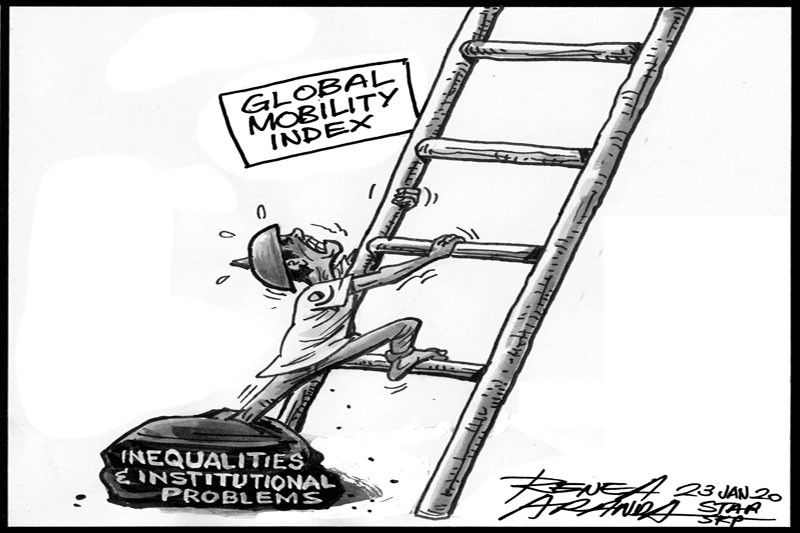EDITORIAL - Poor social mobility

Despite steady economic growth, every administration has admitted that the challenge is making the growth inclusive. This is not achieved by dole-outs even if conditional to the poor, and even less so with politics now allowed to play a role through the unconditional cash transfer.
The long-term solutions lie in structural reforms that will improve health and education services, promote equitable access to technology, and create a better business climate that encourages the generation of meaningful jobs. The reforms should promote the creation of a merit-based society that provides equally shared opportunities for upward mobility.
Where social mobility is robust, gross domestic production can be boosted significantly, according to the World Economic Forum. The WEF has just released its first ever Global Social Mobility Index. Covering 82 economies, the Philippines is in the lower half at 61st place.
In the top 10 are the advanced economies where income disparities are also narrow and where there are substantial investments in public education and health. It is no coincidence that these countries also rank high in global studies on ease of doing business, transparency and the campaign against corruption as well as the latest international assessment of student performance among 12-year-olds.
It’s unfair to compare the Philippines with the best 10 in the index: Denmark, Norway, Finland, Sweden, Iceland, the Netherlands, Switzerland, Austria, Belgium and Luxembourg. In Asia, Japan led the pack at 15th place.
But the Philippines can be compared with its Southeast Asian neighbors, several of which performed better. Perennial achiever Singapore ranked 20th overall; Malaysia placed 43rd; Vietnam, 50th and Thailand, 55th. At least the Philippines ranked ahead of Indonesia, which placed 67th, and Laos, 72nd.
The Philippines scored 51.7 in the index that was based on the pillars of health, education, technology, work, and resilience and institutions. The country scored low in all the pillars, with the lowest in access to the internet and electricity. Adding just 10 points to a country’s social mobility score could translate to a 4.41 percent boost in GDP growth by 2030, according to the WEF.
The WEF study affirms what people have been saying all along: that many things in this country are skewed in favor of a ruling class that comprises a miniscule fraction of the population. Connections matter more than qualifications, wreaking havoc on the delivery of public services and the business environment. Upward mobility is often based on one’s surname and membership in special interest groups.
The Global Social Mobility Index 2020 explains why economies benefit from fixing inequality. This should provide more impetus for long-overdue reforms in the Philippines.
- Latest
- Trending



























